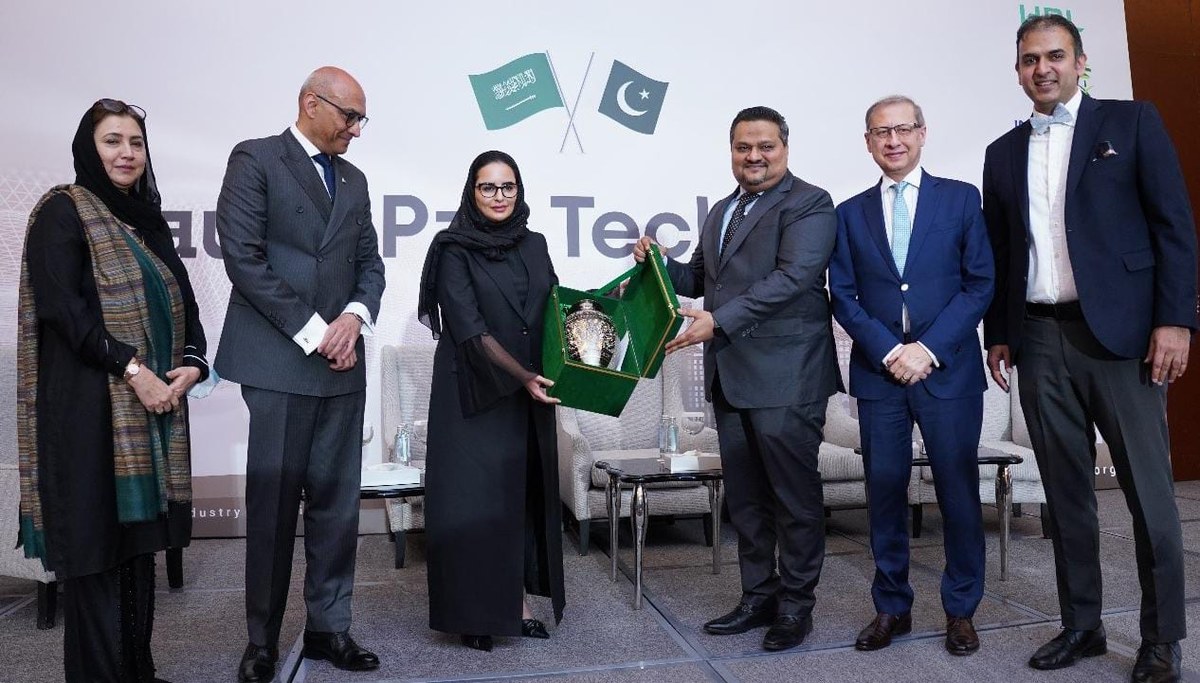ISLAMABAD/KARACHI: Pakistani software and information technology (IT) companies have signed several deals with leading firms in Saudi Arabia and other countries during an ongoing tech exhibition in Riyadh, the head of the Pakistani software producers’ association said on Tuesday.
The LEAP conference and exhibition, which showcases cutting-edge technology, artificial intelligence (AI) initiatives and innovations, is running in Riyadh from March 4 till March 7, featuring over 1,800 local and international exhibitors, around 1,000 technical experts, and 600 startups.
“Last year, LEAP 2023 generated a whopping $9 billion in IT business and Pakistani companies also generated leads worth upwards of $100 million on the sidelines during the B2B [business-to-business] matchmaking,” Muhammad Zohaib Khan, chairman of Pakistan Software Houses Association (P@SHA) said on Wednesday.

Zohaib Khan (third from right), Chairman of Pakistan Software Houses Association (P@SHA), presents a commemorative shield to Deemah Alyahya (second from left), Secretary General of Digital Cooperation Organization (DCO) at Saudi-Pak Tech Forum on the sidelines of LEAP 2024 in Riyadh, Saudi Arabia, on March 6, 2024. ( P@SHA)
This year more than 70 Pakistani companies and 800 delegates are showcasing their products at the exhibition that marks the “largest-ever presence” of the South Asian country anywhere in this sector, according to Khan.
Of these Pakistani firms, 27 were part of the Pakistan Pavilion at the exhibition, while more than 45 others, including 20 startups, were independently presenting their ideas and innovations at the event.
The country’s pavilion was visited by representatives of major IT & ITeS (information technology-enabled services) companies from around the world, including top governmental organizations in the tech sector of the Gulf region.
“During this mega event, P@SHA has signed its largest MoU [memorandum of understanding] to date, focusing on cooperation and enhancing business-to-business engagement with the IT association of Bahrain,” Khan said.
“Pakistani Abacus Consulting has signed an MoU for mutual cooperation with Saudi digital solution provider company, Elm. Furthermore, Inbox Technologies has entered into a partnership deal with Saudi Arabia’s GISSAN.”
The P@SHA chairman said his association had also held a “productive meeting” with the official delegation of the Government of Oman.
On Monday, Pakistan’s envoy to Saudi Arabia, Ahmed Farooq, inaugurated the Pakistan Pavilion at the LEAP 2024 exhibition and witnessed signing of an equity partnership agreement between Pakistan’s SuperNova Solutions and a group of influential Saudi investors.
Farooq said the presence of Pakistani firms in such large numbers at LEAP 2024 underscored the potential for even stronger ties with the Middle East in the IT sector.
“Pakistan contingent is one of the largest at this year’s LEAP, with a 162 square meter pavilion, 74 companies and over 800 delegates demonstrating a robust Pakistani business presence and promising prospects in the Saudi market,” he told Arab News.
“These companies are showcasing solutions in artificial intelligence, IoT [Internet of things], blockchain, cybersecurity, cloud solutions, health tech, fintech, web and mobile app development, open source, e-commerce, data services and more.”
He said Pakistan viewed LEAP 2024 as a “timely opportunity” to showcase its IT potential and expand business in the Middle East, particularly in Saudi Arabia that has been undergoing transformation as part of its Vision 2030.
The Vision 2030 strategic development framework is intended to cut the Kingdom’s reliance on oil and aimed at developing public service sectors, such as health, education, infrastructure, recreation and tourism.
“Saudi Arabia, boasting the largest economy in the Middle East and ranking among the top 20 globally, holds a significant share in the tech industry,” Farooq said, noting that Pakistan’s IT industry had experienced a remarkable growth lately and was ranked among the country’s top five export sectors.
Hassan Khan Lodhi, chief commercial officer of Pakistan’s Inbox Technologies tech firm, shared that his company would soon be opening an office in Riyadh after more than 23 years of experience at home.
“We are back to LEAP this year building on our amazing participation last year, where we managed to close significant business from Saudi Arabia in 2023,” he told Arab News.
Lodhi said his company had completed its registration process in the Kingdom and was looking forward to expand its team, with more manpower on ground.
“The Saudi market has huge prospects and acceptability for Pakistani companies and we look forward to a bright future in the Kingdom,” he added.
On Sunday, P@SHA, in collaboration with the Pakistan Software Export Board (PSEB) along with the country’s embassy in Riyadh – organized a high-profile Saudi-Pak Tech Forum. Deemah Alyahya, the secretary general of the all-powerful Digital Cooperation Organization (DCO) was the chief guest at the event.
Delegations of Special Investment Facilitation Council (SIFC), IT ministry, PSEB, Tech Destination Pakistan, Pak Embassy in Riyadh, HBL, Invest Saudi, Revival Lab and Infotech Group were pivotal to the Saudi-Pak Tech Forum and Pakistan Pavilion.
















